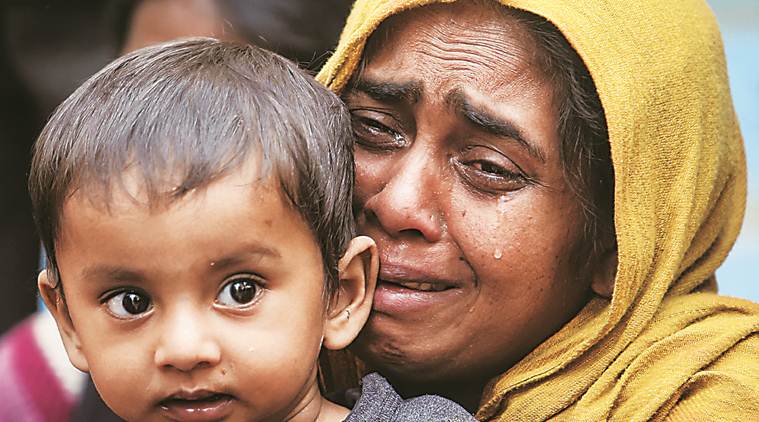
After four days in the cold on no-man’s land, with both Bangladesh and India refusing to accept them, 31 Rohingya were on Tuesday arrested by the BSF and handed over to Tripura Police. Produced before a local court and charged under the Passport Act, the refugees said they had been staying in Jammu for the past six years but were on the run again due to “threats” there. They said they were headed to “safe” Bangladesh.
They had only one plea, though: not to be sent back to Myanmar.
The 31 were intercepted on January 18 while trying to enter Bangladesh. The Border Guards Bangladesh (BRB), however, refused to let them in, saying they had crossed over from the Indian side. The BSF denied this, saying there were no breaches in its border fence.
This left the 31 in the middle of a barren paddy field at Zero Point between the two countries, near the Rairmura Border Outpost, even as the BSF and BGB held a series of flag meetings. On humanitarian grounds, the BSF provided the 31, including 16 children under the age of eight, food, water and blankets.
Eventually, with talks failing, the BSF decided to arrest them. Speaking to The Indian Express in police custody, Abdul Sukkur said they had fled their homes in Rakhine state of Myanmar in 2012 in the wake of a Myanmarese military offensive, along with many others. He said they managed to sneak into India through West Bengal and travelled to
Jammu, as they had been told they could get work there. “We worked as labourers setting up mobile phone towers and lived in a mohalla on the Jammu-Narwal Bypass housing Rohingya refugees. But recently, people and the government had started targeting us, saying we were terrorists. Local people threatened us to leave, and we are on the run again for our lives,” said Muhammad Shahjahan. Breaking down, he added, “If we are sent back to Myanmar, they will simply kill us all. Please don’t send us there.”
Shahjahan said there were 2,500 Rohingya families living in Jammu and doing odd jobs, of which nearly 1,500 had moved out in the wake of threats while others lived in fear.
Sukkur said they had come to Tripura from Jammu via train and were trying to get into Bangladesh when the BGB caught them. Claiming they were beaten up, he added, “My father lives in Bangladesh. There are nearly 15 lakh Rohingya there. We are not welcome in India and Myanmar will kill us. We feel Bangladesh is the only safe place for us for the time being.”
Sukkur also alleged that after arresting them, BSF officials had taken away his UNHCR refugee card and other belongings. “We were able to do odd jobs based on the UNHCR cards.”
Also pleading not to be sent to Myanmar, he said, “My two children have never known normal life. The entire family of my uncle was hacked to death. My aunts and cousins were brutally raped and killed. There is no future for us in Myanmar, only death. We don’t want to die.”
Speaking to The Indian Express from the Jammu-Narwal Rohingya refugee camp, Nazimul Hoque said Sukkur was his brother-in-law and the 31 included his mother-in-law Hasina Begum and two sisters-in-law, Anwara Begum and Zura Begum. “As far as I know, several members of that group of 31 — or probably all of them — hailed from Jammu. They decided to go because after the deportation of our people recently through the Manipur border, there is fear that we too might be sent back.”
Last year, India had repatriated seven Rohingya men, who had been jailed in Assam for entering India illegally six years ago, to Myanmar via Manipur, hours after the Supreme Court had refused to interfere in the process.
Hoque, who claimed to have also come as a refugee in 2012, said, “My relatives started off from Jammu at least 10 days back. There was a middleman who probably promised to help them cross into Bangladesh. I am not aware of the exact mechanism.” He said at least six families from his and nearby camps were part of the group.
Denying Sukkur’s claims of seizure of UNHCR cards, Amtali Sub-Divisional Police Officer Ajay Kumar Das said, “Some of them have verbally admitted to have come from Jammu and Kashmir. We haven’t obtained any UNHCR refugee cards which are usually issued to Rohingya living there and so can’t confirm their claim.”
The BSF PRO said the migrants had been questioned for two days and were confirmed to have come originally from the Rakhine state of Myanmar. How they reached Tripura was yet to be confirmed, he said.
In a letter in October 2017, the Ministry of Home Affairs (MHA) had asked all state governments to take immediate steps to identify and monitor Rohingya refugee. In November, The Indian Express had reported that the J&K Police had started collecting personal details of Rohingya living in the state to identify how, from where and when they came to India, and travelled onto J&K.Expressing despair at this new turn in their lives spent running, Hoque said, “We had come to India seeking relief. But if India is trying to send us back, what’s the use of staying here?”